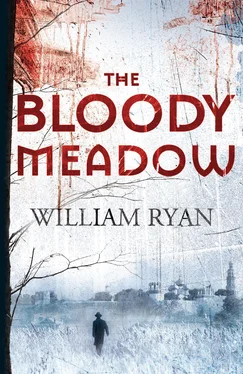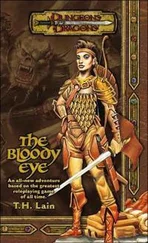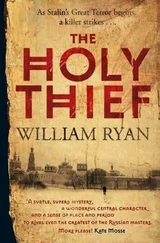William Ryan - The Bloody Meadow
Здесь есть возможность читать онлайн «William Ryan - The Bloody Meadow» весь текст электронной книги совершенно бесплатно (целиком полную версию без сокращений). В некоторых случаях можно слушать аудио, скачать через торрент в формате fb2 и присутствует краткое содержание. Жанр: Исторический детектив, на английском языке. Описание произведения, (предисловие) а так же отзывы посетителей доступны на портале библиотеки ЛибКат.
- Название:The Bloody Meadow
- Автор:
- Жанр:
- Год:неизвестен
- ISBN:нет данных
- Рейтинг книги:5 / 5. Голосов: 1
-
Избранное:Добавить в избранное
- Отзывы:
-
Ваша оценка:
- 100
- 1
- 2
- 3
- 4
- 5
The Bloody Meadow: краткое содержание, описание и аннотация
Предлагаем к чтению аннотацию, описание, краткое содержание или предисловие (зависит от того, что написал сам автор книги «The Bloody Meadow»). Если вы не нашли необходимую информацию о книге — напишите в комментариях, мы постараемся отыскать её.
The Bloody Meadow — читать онлайн бесплатно полную книгу (весь текст) целиком
Ниже представлен текст книги, разбитый по страницам. Система сохранения места последней прочитанной страницы, позволяет с удобством читать онлайн бесплатно книгу «The Bloody Meadow», без необходимости каждый раз заново искать на чём Вы остановились. Поставьте закладку, и сможете в любой момент перейти на страницу, на которой закончили чтение.
Интервал:
Закладка:
The Bloody Meadow
William Ryan
Chapter One
It was snow, or sleet, or something in between – whatever it was, it swirled around them like smoke and seemed to freeze solid as soon as it hit fabric, coating their clothes with a white sheen. It had been snowing, or sleeting, depending on your opinion, for days now and they stepped carefully along the icy path that led to their destination.
Captain Alexei Dmitriyevich Korolev followed the director of the First Mikoyan Agricultural Tooling Trust with a sense of foreboding – the two uniforms and his fellow detective Yasimov trailing behind. Korolev knew this was going to be an awkward job – it just had that feel to it. The director had said as much when they’d told him they were there to question one of his men – at first he’d been all cooperation, but when they’d told him the man’s name, Shishkin, and he’d looked to see where they could find him, his attitude had changed.
‘Shishkin, Shishkin, Shishkin,’ he’d said, going through cards in a wooden filing cabinet. ‘Here we are. Ah. Workers’ Hostel Seven. I should have guessed.’
Korolev was no mind reader but it was clear that ‘Workers’ Hostel Seven’ had a reputation and, now that they were walking towards it, Korolev had a suspicion he knew what kind. The director came to a halt and pointed at a long single-storey wooden building, the pitched roof seeming to bend under its thick helmet of winter snow. The hostel had no gutters and melt water had frozen along its length like a curtain that hung down till it touched the snow bank that had drifted halfway up the wall. What few small windows there were lurked high under the eaves, and several panes had been replaced with whatever had come to hand. It was the kind of place where workers, fresh from the country, turned inwards, recreating their village in a space the size of a cattle barn.
This lot wouldn’t like outsiders. They wouldn’t even like the citizens who lived in the hostels surrounding them. No, this place was a tiny island in the sprawling sea of the city that surrounded it. In fact, the island wasn’t really in Moscow, or even in the Soviet Union – it was somewhere quite different.
‘I’m not going in there, Comrade,’ the director said, stopping, ‘and I have to tell you, I don’t advise you to either. I’ve shown you where he lays his head. If I were you, I’d wait till he comes out.’
Korolev shrugged his shoulders, took a moment to look at Shishkin’s photograph, then showed it to the others to refresh their memories. A wide face topped with a mop of blond hair shaved tight at the sides, a rounded, solid-looking jaw, straight lips. He didn’t look like a killer – in fact there was something open and fresh about the fellow’s face. But apparently Shishkin and his brother had been drinking, and alcohol, as Korolev well knew, could turn a saint into the Devil. The brother had been foreman of a rubber factory in the Frunze district and, it seemed, Shishkin had asked for a job and been refused. Small things became large when vodka coursed through men’s veins – he’d had a case once where two men had been hacked to pieces on account of a pickled cucumber.
‘How many people in there?’ Korolev asked.
‘Five hundred souls, give or take,’ the director said and Korolev knew what that meant – there’d be friends and family who didn’t work for the Trust, there’d have been deaths, there’d have been births. A score of rag-footed children were visible around the hostel and a good half of them wouldn’t be on any list the director had.
‘You see what I mean,’ the director said, indicating with a nod a clump of sullen men who had appeared at the nearest entrance. ‘My authority stops here – hell, even the Party activists don’t visit this place. They’ve their own ways of doing things in there, and it works best for everyone if we leave them to it.’
Korolev looked at the workers by the door – muscular, work-smudged, tough-standing brutes, and not overly fond of the Militia by the look of them. He took a squint at the snap of Shishkin once again.
‘Well, one way or another, we have to go in and talk to him.’
He glanced at the two uniforms – they didn’t look any happier than the last time he’d looked, but they’d do their duty. Yasimov seemed resigned, and Korolev caught him patting the jacket pocket in which he kept his revolver. They’d all seen hostels like this before – places that followed different rules from the rest of the city around them, and were allowed to by men like the director, desperate for workers to meet the factory’s quotas. Korolev started to walk towards the entrance and hoped the uniforms were following. The workers stood aside as they approached, but there was no welcome in their hard eyes, and he could hear them turning and following close behind, cutting off their escape.
He pushed open the door of the hostel and entered.
It was as he’d thought it would be – like the inside of an ants’ nest, if ants were humans and lived in the city of Moscow in the year of Our Lord 1937. Everywhere there were people and their possessions. Along one wall small rooms for families had been built, like stables, and from the empty doorframes of which the lucky inhabitants had hung blankets or sheets to give themselves some privacy. Elsewhere, however, every spare inch of floorspace had been filled with beds, mattresses and sacking and on them the rest of the hostel’s occupants were sleeping, sitting, playing cards, drinking, smoking and doing every other thing that a citizen might do in the comfort of his home – except that here he was sharing his living space with half a thousand others. And above the people hung wet clothing and bedding from washing lines that criss-crossed the room in no apparent order so that the ceiling was invisible. Korolev stood there taking it in, before walking slowly through the room, scanning each face as he did so, and finding himself being examined with the same care in return.
Korolev kept moving forward, pushing gently past the people who stood in the space between the cubicles and the beds, looking for Shishkin. At least it was warm, he thought to himself, even if it was the warmth of a shed full of cattle – the cast-iron stoves that lined the centre of the room every seven or eight metres probably gave out less heat than the people crammed in around them. There was no point in asking for the fellow, no one here would tell him anything. Already their presence was like a pebble thrown into a pond – a ripple of silence rolled out from them, till it seemed that the loudest noise in the place was the heavy tread of his hobnailed heels on the wooden floorboards. He cursed the boots, only four months old and things of beauty, but as out of place here as a crystal chandelier. They labelled him as well, and it wasn’t a label he much liked to have applied. Still, at least the silent faces turning towards him one after another, grimy white against their work-soiled clothes, made his search for Shishkin that much easier.
The hostel was split into two main rooms, with a cooking and washing area separating the two, and the further they advanced towards the centre of the building the less the noise of his boots was evident. There were other noises – coughing, the rustle of clothes, the snoring of sleeping workers, dripping water, the cluck of a chicken picking its way between the beds. There was still no sign of Shishkin, but that might be the least of their problems. Women and children were being ushered into the cubicles and young men woken from their sleep to stand and examine the Militiamen with bleary eyes. Korolev could hear people following them through the building, but he didn’t look round. If he looked, he’d have to confront them, and that would mean trouble. He squared his shoulders and marched on, feeling the sudden heat from the cooking area, where red-faced women crouched over primus stoves – the sound of them like the roar of a blast furnace.
Читать дальшеИнтервал:
Закладка:
Похожие книги на «The Bloody Meadow»
Представляем Вашему вниманию похожие книги на «The Bloody Meadow» списком для выбора. Мы отобрали схожую по названию и смыслу литературу в надежде предоставить читателям больше вариантов отыскать новые, интересные, ещё непрочитанные произведения.
Обсуждение, отзывы о книге «The Bloody Meadow» и просто собственные мнения читателей. Оставьте ваши комментарии, напишите, что Вы думаете о произведении, его смысле или главных героях. Укажите что конкретно понравилось, а что нет, и почему Вы так считаете.












